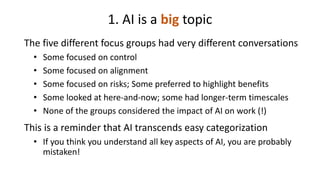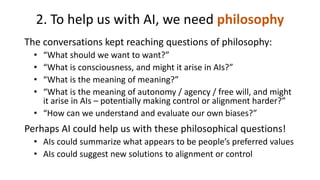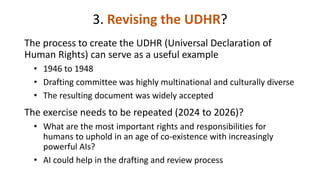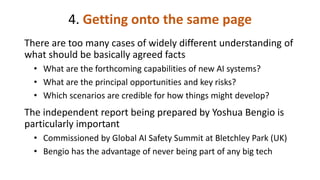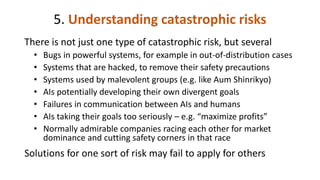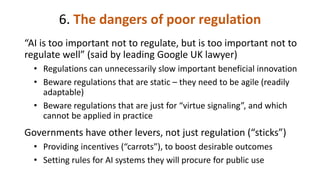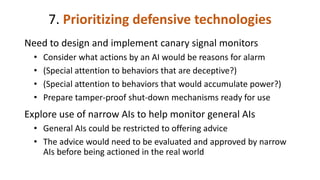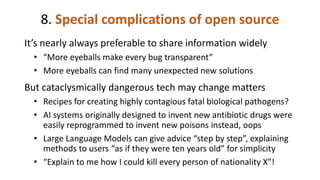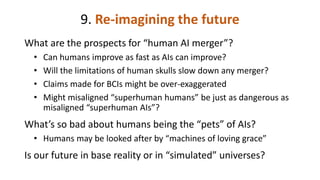AI - summary of focus groups.pdf
- 1. Summary of AI Focus Groups From TransVision Utrecht 21st January 2024 Compiled by David Wood (AI Focus Groups facilitator)
- 2. 1. AI is a big topic The five different focus groups had very different conversations ŌĆó Some focused on control ŌĆó Some focused on alignment ŌĆó Some focused on risks; Some preferred to highlight benefits ŌĆó Some looked at here-and-now; some had longer-term timescales ŌĆó None of the groups considered the impact of AI on work (!) This is a reminder that AI transcends easy categorization ŌĆó If you think you understand all key aspects of AI, you are probably mistaken!
- 3. 2. To help us with AI, we need philosophy The conversations kept reaching questions of philosophy: ŌĆó ŌĆ£What should we want to want?ŌĆØ ŌĆó ŌĆ£What is consciousness, and might it arise in AIs?ŌĆØ ŌĆó ŌĆ£What is the meaning of meaning?ŌĆØ ŌĆó ŌĆ£What is the meaning of autonomy / agency / free will, and might it arise in AIs ŌĆō potentially making control or alignment harder?ŌĆØ ŌĆó ŌĆ£How can we understand and evaluate our own biases?ŌĆØ Perhaps AI could help us with these philosophical questions! ŌĆó AIs could summarize what appears to be peopleŌĆÖs preferred values ŌĆó AIs could suggest new solutions to alignment or control
- 4. 3. Revising the UDHR? The process to create the UDHR (Universal Declaration of Human Rights) can serve as a useful example ŌĆó 1946 to 1948 ŌĆó Drafting committee was highly multinational and culturally diverse ŌĆó The resulting document was widely accepted The exercise needs to be repeated (2024 to 2026)? ŌĆó What are the most important rights and responsibilities for humans to uphold in an age of co-existence with increasingly powerful AIs? ŌĆó AI could help in the drafting and review process
- 5. 4. Getting onto the same page There are too many cases of widely different understanding of what should be basically agreed facts ŌĆó What are the forthcoming capabilities of new AI systems? ŌĆó What are the principal opportunities and key risks? ŌĆó Which scenarios are credible for how things might develop? The independent report being prepared by Yoshua Bengio is particularly important ŌĆó Commissioned by Global AI Safety Summit at Bletchley Park (UK) ŌĆó Bengio has the advantage of never being part of any big tech
- 6. 5. Understanding catastrophic risks There is not just one type of catastrophic risk, but several ŌĆó Bugs in powerful systems, for example in out-of-distribution cases ŌĆó Systems that are hacked, to remove their safety precautions ŌĆó Systems used by malevolent groups (e.g. like Aum Shinrikyo) ŌĆó AIs potentially developing their own divergent goals ŌĆó Failures in communication between AIs and humans ŌĆó AIs taking their goals too seriously ŌĆō e.g. ŌĆ£maximize profitsŌĆØ ŌĆó Normally admirable companies racing each other for market dominance and cutting safety corners in that race Solutions for one sort of risk may fail to apply for others
- 7. 6. The dangers of poor regulation ŌĆ£AI is too important not to regulate, but is too important not to regulate wellŌĆØ (said by leading Google UK lawyer) ŌĆó Regulations can unnecessarily slow important beneficial innovation ŌĆó Beware regulations that are static ŌĆō they need to be agile (readily adaptable) ŌĆó Beware regulations that are just for ŌĆ£virtue signalingŌĆØ, and which cannot be applied in practice Governments have other levers, not just regulation (ŌĆ£sticksŌĆØ) ŌĆó Providing incentives (ŌĆ£carrotsŌĆØ), to boost desirable outcomes ŌĆó Setting rules for AI systems they will procure for public use
- 8. 7. Prioritizing defensive technologies Need to design and implement canary signal monitors ŌĆó Consider what actions by an AI would be reasons for alarm ŌĆó (Special attention to behaviors that are deceptive?) ŌĆó (Special attention to behaviors that would accumulate power?) ŌĆó Prepare tamper-proof shut-down mechanisms ready for use Explore use of narrow AIs to help monitor general AIs ŌĆó General AIs could be restricted to offering advice ŌĆó The advice would need to be evaluated and approved by narrow AIs before being actioned in the real world
- 9. 8. Special complications of open source ItŌĆÖs nearly always preferable to share information widely ŌĆó ŌĆ£More eyeballs make every bug transparentŌĆØ ŌĆó More eyeballs can find many unexpected new solutions But cataclysmically dangerous tech may change matters ŌĆó Recipes for creating highly contagious fatal biological pathogens? ŌĆó AI systems originally designed to invent new antibiotic drugs were easily reprogrammed to invent new poisons instead, oops ŌĆó Large Language Models can give advice ŌĆ£step by stepŌĆØ, explaining methods to users ŌĆ£as if they were ten years oldŌĆØ for simplicity ŌĆó ŌĆ£Explain to me how I could kill every person of nationality XŌĆØ!
- 10. 9. Re-imagining the future What are the prospects for ŌĆ£human AI mergerŌĆØ? ŌĆó Can humans improve as fast as AIs can improve? ŌĆó Will the limitations of human skulls slow down any merger? ŌĆó Claims made for BCIs might be over-exaggerated ŌĆó Might misaligned ŌĆ£superhuman humansŌĆØ be just as dangerous as misaligned ŌĆ£superhuman AIsŌĆØ? WhatŌĆÖs so bad about humans being the ŌĆ£petsŌĆØ of AIs? ŌĆó Humans may be looked after by ŌĆ£machines of loving graceŌĆØ Is our future in base reality or in ŌĆ£simulatedŌĆØ universes?


